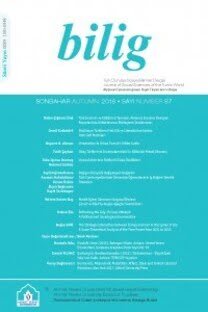İktisadî Adamdan Toplum Adamına
From Economic Man To Social Man
___
Backhouse, Roger E. (2002). The Ordinary Business of Life: A History of Economics from the Ancient World to the Twenty-First Century. Princeton and Oxford: Princeton University Press.Ben-Ner, Avner and Louis Putterman (1997). Values and Institutions in Economic Analysis 1. 27 Jan 1997 version. http://www.brown.edu (16.08.2005).
Brockway, George P. (1991). The End of Economic Man: Principles of Any Future Economics. HarperCollins/Cornelia & Michael Bessie Books. http://search.epnet.com (25.04.2004).
Bryant, Joseph M. (2000). “Cost-Benefit Accounting and the Piety Business: Is Homo Religiosus, At Bottom, A Homo Economicus?”. Method & Theory in the Study of Religion. 09433058. 12(4).
Campbell, Donald T. (1983). “The Two Distinct Routes beyond Kin Selection to Ultrasociality: Implications for the Humanities and the Social Sciences”. The Nature of Prosocial Development: Interdisciplinary Theories and Strategies. Ed. Diane Bridgeman. New York: Academic Press.
Dingley, James C. (1997). “Durkheim, Mayo, Morality and Management”. Journal of Business Ethics. Augustos ’97. 16(11): 1117-29. http://search.epnet.com (04.06.2004).
Etzioni, Amitai (1988). The Moral Dimension: Toward a New Economics. New York: Free Press.
Faber, Malte, Reiner Manstetten and Thomas Petersen (1997). “Homo Oeconomicus and Homo Politicus. Political Economy. Constitutional Interest and Ecological Interest”. Kyklos. 50 (4): 457-83. Item: 318968.
Fox, Maggie (2008). “Money Buys Happiness If You Spend on Someone Else”. http://www.reuters.com/article. March 20. (06.07.2008)
Friedman, Milton (1970). “The Social Responsibility of Business is to Increase its Profits”. The New York Times Magazine. September 13. http://www.colorado.edu/studentgroups/ libertarians/issues/friedman-soc-resp-business.html. (06.07.2008)
Gagnier, Regenia (1993). “On the Insatiability of Human Wants: Economic and Aesthetic Man”. Victorian Studies 36 (2): 125-53.
Hirsch, P., S. Michaels and R. Friedman (1990). “Clean models vs. dirty hands: Why economics is different from sociology” Structures of Capital: The Social Organization of the Economy. Ed. S. Zukin and P. DiMaggio. Cambridge: Cambridge University Press. 39-56.
Hodgson, Geoffrey M. (1998). “The Approach of Institutional Economics”. Journal of Economic Literature. March. 36:166-192.
Liluashvili, Gia (2002). “Legal Culture, Problems and Some Solutions”. Khidi. 7: 5-7.
Lutz, Mark A. (1985). “Beyond Economic Man: Humanistic Economics”. Economics and Philosophy. Ed. Peter Koslowski. Tubingen: J. C. B. Mohr.
Lutz, Mark A. and Kenneth Lux (1988). Humanistic Economics: The New Challenge. New York: Bootstrap Press.
Maslow, Abraham H. (1971). The Farther Reaches of Human Nature. New York: Penguin.
Nitsch, Thomas O. (1982). “Economic Man, Socio-economic Man and Homo-economicus Humanus”. International Journal of Social Economics 9 (6/7): 20-49.
O'boyle, Edward J. (1994). “Homo Socio-Economicus: Foundational to Social Economics and the Social Economy”. Review of Social Economy. Fall. 52:286-313.
Orloff, Pierre (2001). “Business Culture”. Doing Business with Georgia. Ed. Marat Terterov. London: Kogan Page Ltd.
Papava, Vladimer and Elene Chikovani (Ed.) (1997). “Georgia: Economic and Social Challenges of the Transition (GESCT)”. Problems of Economic Transition. November/December.
Parker, R. A. C. (1989). The Second World War: A Short History. London: Oxford University Press.
Samuels, Warren J. (1990). “Four Strands of Social Economics: A Comparative Interpretation”. Social Economics: Retrospect and Prospect. Ed. Mark A. Lutz. Boston: Kluwer Academic.
Smith, Adam (2004). An Inquiry into the Nature and Causes of the Wealth of Nations: Part 10. Harvard Classics. Kessinger Publishing.
Sulaberidze, A. (2004). “On Certain Factors That Determine the Present Transformation of Society and the Family in Georgia”. Sociological Research. November–December. 43(6): 75–86.
Taylor, John B. (2004). “Economic Freedom and Georgia’s Rose Revolution”. November 22. Tbilisi. http://www.treasury.gov (03.06.2006).
Tomer, John F. (1996). “Good habits and bad habits: A new age socio-economic model of preference formation”. Journal of Socio-Economics 25 (6). 619-38.
Tomer, John F. (2001). “Economic man vs. hetedox men: The concepts of human nature in schools of economic thought”. Journal of Socio-Economics 30 (4): 281-94.
Waters, William R. (1988). “Social Economics: A Solidarist Perspective”. Review of Social Economy. October. 46: 113-143.
Whalen, Charles J. (1996). “The Institutional Approach to Political Economy”. Beyond Neoclassical Economics: Heterodox Approaches to Economic Theory. Ed. Fred E. Foldvary. Brookfield: Edward Elgar.
Wilber, Ken (1996). The Atman Project: A Transpersonal View of Human Development. Quest Books. Wheaton. IL.
Zurabishvili, Tamara and Tinatin Zurabishvili (2004). “Georgia: Persistent Paternalism”. Sociological Research. November-December 43 (6): 87-97.
- ISSN: 1301-0549
- Yayın Aralığı: 4
- Başlangıç: 1996
- Yayıncı: Ahmet Yesevi Üniversitesi Mütevelli Heyet Başkanlığı
Bahçesaray Köleleri (17.-18. Yüzyıllar)
Kazakistan Ekonomisinin Petrole Bağımlılığının Azaltılmasında Para Politikasının Rolü
Divânü Lugâti’t-Türk’te Kençekler ve Bazı Kençekçe Kelimeler Üzerine Düşünceler
Ana Dili Eğitiminde Parçalarüstü Birimlerin Önemi ve Teknoloji Destekli Olarak Kavratılması
Tarık Buğra’nın Öyküleri ve Öykücülüğü
Altay Tuvaları - Altaylarda Unutulmuş Bir Türk Halkı
Emperyalizmin Ortadoğu Tecrübesinden Bir Kesit: Suriye’de Fransız Mandası
Timurluların İslam Maden Sanatına Katkıları
Kazak Kültürel Hayatında Tatarların Etkisi ve Kazak Ceditçiliğinin Gelişimi
